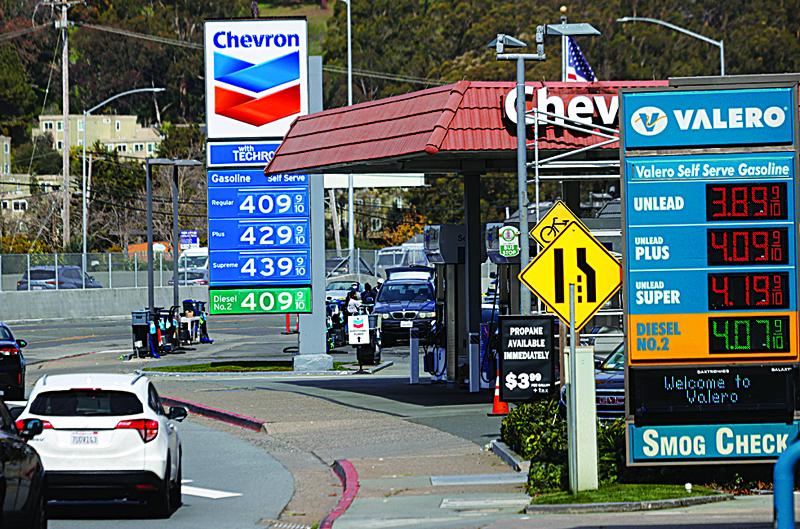 MILL VALLEY, US: In this file photo, gas prices are displayed at a Chevron gas station in Mill Valley, California. - AFP
MILL VALLEY, US: In this file photo, gas prices are displayed at a Chevron gas station in Mill Valley, California. - AFPPARIS: Global oil demand has dropped for three straight months as COVID cases have risen in Asia but it is expected to bounce back next month, the International Energy Agency said yesterday. Demand fell from July after rebounding the previous month, with major crude consumer China leading the decline, the IEA said in a monthly report. "Global oil demand remains under pressure from the virulent COVID-19 Delta variant in key consuming regions, especially in parts of Asia," the report said.
Demand fell by 310,000 barrels per day on average over the three months to September. But it is expected to recover in October with an increase of 1.6 million barrels per day (mbd) and continue to rise until the end of the year, said the IEA, which advises developed countries on energy policy. "The latest news on the COVID front is more optimistic, with global cases falling in recent weeks, continued progress in vaccine manufacturing and inoculations, and less restrictive social distancing measures in many countries," it said. Global oil demand is expected to rise by 5.2 mbd this year, slightly lower than previously forecast, but 2022 growth will be slightly higher at 3.2 mbd, according to the report.
The IEA said Hurricane Ida "wreaked havoc on the key US Gulf Coast oil producing region" in late August and is "still causing problems for US and global markets." Offshore installations and refineries have been slow to restart, forcing massive draws of stocks of both crude and products in key markets, it said. "It is only by early 2022 that supply will be high enough to allow oil stocks to be replenished," the IEA said.
The Organization of the Petroleum Exporting Countries said on Monday that it expects global oil demand to exceed its pre-pandemic level next year thanks to the roll out of vaccines and the economic recovery. The forecast came as OPEC cartel nations and their allies, together known as OPEC+, are beginning to raise output to meet recovering demand.
Meanwhile, Chevron said yesterday it will lift spending on lower carbon energy while still investing primarily in fossil fuels as it updated its climate strategy in the face of investor pressure. The US oil giant said it would more than triple spending through 2028 to $10 billion on its "lower carbon businesses," including $2 billion to lower the carbon intensity of Chevron's operations. The program includes increasing production of renewable natural gas, renewable fuels and boosting hydrogen production, according to a press release ahead of presentations by executives.
However, the capital spending is still much lower than that planned for conventional oil and gas. Chevron said in March it plans $14 billion to $16 billion in annual capital spending between 2021 and 2025. Also, the company did not promise to reach "net zero" emissions in its overall business by 2050, a pledge taken by rivals such as Royal Dutch Shell and Total. Like its US rival ExxonMobil, Chevron has faced intensifying pressure from investors on climate policy. In May, 61 percent of shareholder voted in favor of a shareholder proposal calling on Chevron to reduce its "Scope 3" carbon emissions, those connected to products sold by the company.
Shareholders also narrowly defeated a proposal requiring a report on a "Net Zero 2050" scenario, such as ones discussed by the International Energy Agency. In a presentation on Chevron's website, Chief Executive Mike Worth said the company would update its climate change report next month to include a response to the Scope 3 proposal and net zero.
Activists expressed skepticism about Chevron's approach to climate change and the energy transition in interviews ahead of investor presentations. The company's statements since the shareholder vote have been "not very promising," said Mark van Baal, founder of Follow This, a Dutch activist shareholder group that authored the Scope 3 resolution at Chevron. "If the world is to avoid climate disaster, then the reductions need to be done this decade," van Baal said on Monday. - AFP










